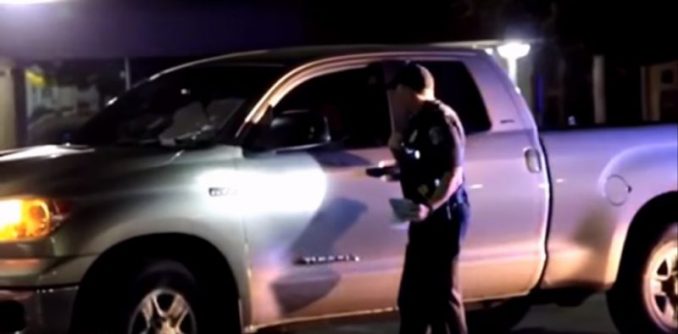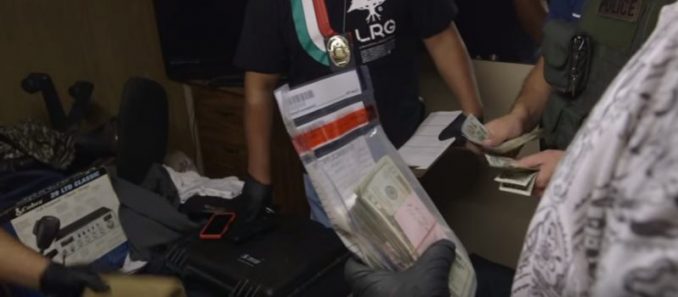The police stopped a couple carrying over $107,000 in cash and seized the “crime” money. However, it seems that it was legitimately theirs. The couple went to get it back, but that’s when their problems really started.

Adam and Jennifer Perry were stopped for speeding in Henry County, Illinois, where police seized more than $107,000 from the married Massachusetts couple, who they initially suspected of a crime. However, even years after the seizure, no charges were ever filed. Still, the couple’s money, which they claim was earned legally, has not been returned because of the civil forfeiture law.
After pulling them over for the routine traffic stop, the Illinois police searched the couple’s Toyota Tundra with the help of a K-9 unit and found a suitcase containing $102,000 in cash, according to the Dispatch-Argus. Another $5,520 was found in Jennifer’s wallet. Although no drugs were found, the police suspected the Perrys of criminal activity, so they seized their cash as well as their vehicle.

Of course, the Perrys — who were on their way to a doctor’s appointment in Salt Lake City, Utah, where Adam was going to see a hearing specialist — insisted that they didn’t do anything wrong. They explained that the money was from insurance settlements, vehicle sales, personal income, disability benefits, and other legal means.
After hours of questioning but no evidence of a crime, the police eventually let the Perrys go. However, they used civil forfeiture law to keep every dollar in the truck, as well as the vehicle itself, and even Mrs. Perry’s wedding rings, without law enforcement having to press even a single charge, under only the assumption that the money and vehicle were tied to illegal activity.

Years later, the Perrys were still left fighting to get their property back after a federal judge demanded that the couple prove how they got the money. However, Adam Perry argued that not only has he and his wife already provided an explanation, but they shouldn’t have to prove their innocence. Instead, it should be the police and prosecutors who need to prove guilt. Unfortunately, that’s not how civil forfeiture works.
“This is not Nazi Germany where you can treat people like this,” Mr. Perry wrote in a letter to the federal judge. “You should be treating me innocent until proven guilty and not denying me my right to counsel,” Adam added. “I even begged and said please just give me my truck back and you can keep the money and I’ll walk away from it. Still denied,” he continued. “You don’t understand the emotional, physical and financial terrorism you have caused.”

The judge didn’t agree. Four years of fighting later, the federal judge granted a government request to keep the cash found in the Ashburnham, Massachusetts, couple’s vehicle during the traffic stop. According to Mass Live, “Judge Sara Darrow, of the U.S. District Court for the Central District of Illinois, said the couple failed to answer questions about where the funds came from,” as she granted the request to permanently reward the funds to the government.
The federal civil forfeiture program — also called the civil asset forfeiture, civil judicial forfeiture, or occasionally civil seizure — is the controversial legal process in which law enforcement officers take assets from persons suspected of being involved in crime or illegal activity without necessarily charging the owners with wrongdoing.

“While civil procedure, as opposed to criminal procedure, generally involves a dispute between two private citizens, civil forfeiture involves a dispute between law enforcement and property such as a pile of cash or a house or a boat, such that the thing is suspected of being involved in a crime. To get back the seized property, owners must prove it was not involved in criminal activity,” Wikipedia explains.
It has been a very hotly debated issue, across many administrations, with the law and its oversight often changing. In 2015, the “adoptive forfeiture,” which occurs “when a state or local law enforcement agency seizes property pursuant to state law and requests that a federal agency take the seized asset and forfeit it under federal law,” was ended due to abuse. As Wikipedia further explains, “Although states proceeded to curtail the powers of police to seize assets, actions by the Justice Department in July 2017 have sought to reinstate police seizure powers to raise funding for federal agencies and local law enforcement.”

Explaining the pros and cons to the program, Wiki continues, “Proponents see civil forfeiture as a powerful tool to thwart criminal organizations involved in the illegal drug trade, with $12 billion annual profits, since it allows authorities to seize cash and other assets, from narcotics trafficking.
They also argue that it is an efficient method since it allows law enforcement agencies to use these seized proceeds to further battle illegal activity, that is, directly converting value obtained from illegal items for law enforcement purposes by harming criminals economically while helping law enforcement financially.”
Of course, “Critics argue that innocent owners can become entangled in the process to the extent that their right to property is violated, with few legal protections and due process rules to protect them in situations where they are presumed guilty instead of being presumed innocent,” as Wiki explains. “Further, critics argue that the incentives lead to corruption and law enforcement misbehavior. There is [a] consensus that abuses have happened but disagreement about their extent as well as whether the overall benefits to society are worth the cost of the instances of abuse.”
Although the benefits of the program can be debated and the guilt or innocence of the Perrys is unknown, it would certainly seem that the Perrys did become entangled in the controversial process and that their rights were violated as guilt was assumed and they were left with the burden of proving their innocence.







